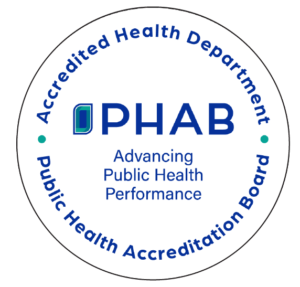Lake County General Health District (LCGHD) conducts ongoing surveillance to assist with the prevention and control of disease and other health concerns of Lake County residents. Our goal is to support the community through:
- Collecting, investigating, and analyzing various communicable diseases
- Providing supportive resources and care
- Distributing information on the incidence and prevalence of general infectious diseases within Lake County
- Developing methods to respond in the event of a communicable disease threat
Information about our current programs is provided in the tabs below.
Please visit our Clinics page for information about Immunization, Tuberculosis (TB) testing, and Human Immunodeficiency Virus (HIV) testing clinics.
Programs
Newborn Home Visiting Program
We regret to inform you that the LCGHD will no longer be providing new born home visits. We apologize for the inconvenience and would like to encourage you to contact your healthcare provider for any questions or concerns regarding your post-partum health or newborns well-being.
Children with Medical Handicaps
The Children with Medical Handicaps (CMH) Program is a statewide program that links families of children with special health care needs to a network of quality providers and helps families obtain payment for the services their child may need. CMH works with health care providers to ensure that every child with a special health care need has a patient-centered medical home.
Eligibility Requirements:
To be eligible for the program, children must meet all three of the following criteria:
- 0-21 years of age
- Permanent resident of Ohio
- Under the care of a CMH-approved physician for a chronic medical condition
Examples of eligible conditions for CMH services include, but are not limited to: AIDS, cancer, cerebral palsy, cleft lip/palate, cystic fibrosis, diabetes, scoliosis, hemophilia, hearing loss, juvenile arthritis, metabolic disorders, severe vision disorders, sickle cell
If you are unsure if your child meets the criteria, would like additional information , or need assistance with the application process, please contact our CMH nurse at (440) 350-2554.
Additional Resources
CMH Providers by County
How to Enroll
Lead Testing
The Lake County General Health District provides lead testing for children between the ages of one and six (1-6). Lead toxicity has been known to have harmful effects of the developing brain and nervous system in young children. Although Lake County is considered to have a lower risk when compared to other Ohio counties, there are still potential risk factors in neighborhoods that have older homes. Lake County presently has four (4) zip codes that are considered “high risk” and require blood lead testing: 44057, 44077, 44092, and 44094.
For additional information regarding lead testing and prevention in young children, please call (440) 350-2554 and ask to speak with one of our public health nurses.
Additional Resources
Blood Lead Testing Requirement
Childhood Lead Poisoning
Information for Parents
Risk Factors
Ohio County Data Sheets
Communicable Diseases
Communicable Disease
The LCGHD Communicable Disease Department is guided by the Ohio Administrative Code (OAC). The most used tool is the Ohio Department of Health’s (ODH) Infectious Disease Control Manual (IDCM). Communicable Disease Rules 3701-3-01 through 3703-3-31 as well as additional rules which pertain to infectious disease reporting and disease control are what guides our work.
Ohio has a list of diseases that are reportable (Know your ABCs: A Quick Guide to Reportable Infectious Diseases in Ohio). The list is divided into three classes: Class A, Class B, and Class C. Reporting diseases is an important part of public health, to allow for disease control and prevention for the health of our county, to identify outbreaks, and to control further suffering.
Each reportable disease is described in the ICDM including reporting requirements, the causative agents, the Centers for Disease Control and Prevention (CDC) or Ohio Department of Health (ODH) surveillance definition, signs and symptoms, diagnostic criteria, epidemiology, and public health case management.
Ohio’s communicable disease reporting requirements mandate that healthcare providers with the knowledge of a case or a suspected case of a disease report that disease to the local health department. This information is confidential. The information that is conveyed includes the name, diagnosis, date of birth, street address, city, telephone number, and information about the health care provider. Laboratories must also report the same information along with the lab report details.
There are many practical steps you can take to prevent communicable disease, including:
- Proper hand washing
- Safe handling and preparation of food
- Cough and sneeze into your sleeve
- Clean and disinfect commonly used surfaces
- Refrain from sharing personal items
- Get vaccinated
- Avoid touching wild animals
- Stay home when sick
How to Report a Communicable Disease
- Review the Ohio Infectious Disease Control Manual for specific reporting information and educational material about the suspected disease.
- Complete the Ohio Reportable Disease Form. If reporting Varicella (Chickenpox), please use the Varicella Report Form.
- Fax your report to the Health Department Confidential Fax Line: (440) 359-6219.
- Contact the Health Department Communicable Disease Investigator: (440) 350-2467 or (440) 350-2482. For after-hours reporting, call (440) 478-7321.
Once a reportable communicable disease diagnosis is verified, a public health disease investigator begins their work to:
- Confirm the diagnosis and original source of the disease
- Locate the affected person(s)
- Determine potential common modes of transmission among affected persons
- Provide disease information to the affected persons and public. This includes the signs and symptoms of the disease, how a diagnosis is confirmed, how the disease is spread, and measures for disease prevention
- In some cases, the communicable disease investigators and environmental health staff work together for a coordinated and timely response
For more information, please contact our staff at (440) 350-2467 or (440) 350-2482.

